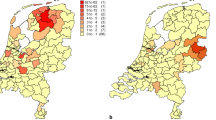Abstract
Cardiogenetics faces two major challenges: identifying index cases and making optimal use of sequencing technologies. Nonexpert physicians need to be actively engaged to identify index cases, not only in cardiology and clinical genetics but also in primary care, population screening, at postmortem, and elsewhere in health care. Training, including e-modules, is needed to update knowledge and skills. An active approach to test family members of diagnosed cases may save lives. With decreasing prices of sequencing technologies, the temptation to sequence everything that is possible might lead to many variants of unknown significance. Patients and their families would be better served by targeted analysis of variants of high predictive value and selecting the DNA test based on the phenotype. Data sharing and more detailed and precise phenotyping will help to better understand the current variants of unknown significance.
Access this chapter
Tax calculation will be finalised at checkout
Purchases are for personal use only
Similar content being viewed by others
References
Bagnall RD, Weintraub RG, Ingles J, Duflou J, Yeates L, Lam L, et al. A Prospective Study of Sudden Cardiac Death among Children and Young Adults. N Engl J Med. 2016;374:2441–52.
Carpay MEM, van der Horst A, Hoebee B. Eindrapportage bevolkingsonderzoek naar familiaire hypercholesterolemie. Organisatie en opbrengsten. RIVM Briefrapport 2014–0152. 2014. Bilthoven, RIVM.
European Society of Human Genetics. Genetic testing in asymptomatic minors: recommendations of the European Society of Human Genetics. Eur J Hum Genet. 2009;17:720–1.
Green RC, Berg JS, Grody WW, et al. ACMG recommendations for reporting of incidental findings in clinical exome and genome sequencing. Genet Med. 2013;15:565–74.
Haas J, Frese KS, Peil B, Kloos W, Keller A, Nietsch R, et al. Atlas of the clinical genetics of human dilated cardiomyopathy. Eur Heart J. 2015;36:1123–35a.
Hehir-Kwa JY, Claustres M, Hastings RJ, van Ravenswaaij-Arts C, Christenhusz G, Genuardi M, et al. Towards a European consensus for reporting incidental findings during clinical NGS testing. Eur J Hum Genet. 2015;23:1601–6.
Henneman L, McBride CM, Cornel MC, Duquette D, Qureshi N. Screening for familial hypercholesterolemia in children: What can we learn from adult screening programs? Healthcare. 2015;3:1018–30.
Houwink EJ, Muijtjens AM, van Teeffelen SR, Henneman L, Rethans JJ, Jacobi F, et al. Effect of comprehensive oncogenetics training interventions for general practitioners, evaluated at multiple performance levels. PLoS One. 2015;10(4):e0122648.
Houwink EJ, Sollie AW, Numans ME, Cornel MC. Proposed roadmap to stepwise integration of genetics in family medicine and clinical research. Clin Transl Med. 2013;2:5.
Ingles J, Semsarian C. Conveying a probabilistic genetic test result to families with an inherited heart disease. Heart Rhythm. 2014a;11:1073–8.
Ingles J, Semsarian C. The value of cardiac genetic testing. Trends Cardiovasc Med. 2014b;24:217–24.
Kassner U, Wuhle-Demuth M, Missala I, Humphries SE, Steinhagen-Thiessen E, Demuth I. Clinical utility gene card for: Hyperlipoproteinemia, TYPE II. Eur J Hum Genet. 2014. doi:10.1038/ejhg.2013.271.
Nordestgaard BG, Chapman MJ, Humphries SE, Ginsberg HN, Masana L, OS D, et al. Familial hypercholesterolaemia is underdiagnosed and undertreated in the general population: guidance for clinicians to prevent coronary heart disease consensus statement of the European Atherosclerosis Society. Eur Heart J. 2013;34:3478–90.
Nunn LM, Lopes LR, Syrris P, Murphy C, Plagnol V, Firman E, et al. Diagnostic yield of molecular autopsy in patients with sudden arrhythmic death syndrome using targeted exome sequencing. Europace. 2015; pii: euv285.
Semsarian C, Ingles J. Determining pathogenicity in cardiac genetic testing: filling in the blank spaces. Trends Cardiovasc Med. 2015a;25:653–4.
Semsarian C, Ingles J, Wilde AA. Sudden cardiac death in the young: the molecular autopsy and a practical approach to surviving relatives. Eur Heart J. 2015b;36:1290–6.
St. Pierre J, Bach J, Duquette D, Oehlke K, Nystrom R, Silvey K, et al. Strategies, actions, and outcomes of pilot state programs in public health genomics, 2003–2008. Prev Chronic Dis. 2014;11:E97.
Stattin EL, Westin IM, Cederquist K, Jonasson J, Jonsson BA, Mörner S, et al. Genetic screening in sudden cardiac death in the young can save future lives. Int J Legal Med. 2016;130:59–66.
van der Werf C, Hendrix A, Birnie E, Bots ML, Vink A, Bardai A, et al. Improving usual care after sudden death in the young with focus on inherited cardiac diseases (the CAREFUL study): a community-based intervention study. Europace. 2015; pii: euv059.
Van El CG, Cornel MC, Borry P, Hastings RJ, Fellmann F, Hodgson SV, et al. Whole-genome sequencing in health care: recommendations of the European Society of Human Genetics. Eur J Hum Genet. 2013;21:580–4.
Wiegman A, Gidding SS, Watts GF, Chapman MJ, Ginsberg HN, Cuchel M, et al. Familial hypercholesterolaemia in children and adolescents: gaining decades of life by optimizing detection and treatment. Eur Heart J. 2015;36:2425–37.
Wilson JMG, Jungner G. Principles and practice of screening for disease, vol. 68. Geneva: World Health Organization; 1968.
Author information
Authors and Affiliations
Corresponding author
Editor information
Editors and Affiliations
Rights and permissions
Copyright information
© 2016 Springer International Publishing Switzerland
About this chapter
Cite this chapter
Cornel, M.C., Houwink, I., Semsarian, C. (2016). Future of Cardiogenetics. In: Baars, H., Doevendans, P., Houweling, A., van Tintelen, J. (eds) Clinical Cardiogenetics. Springer, Cham. https://doi.org/10.1007/978-3-319-44203-7_24
Download citation
DOI: https://doi.org/10.1007/978-3-319-44203-7_24
Published:
Publisher Name: Springer, Cham
Print ISBN: 978-3-319-44202-0
Online ISBN: 978-3-319-44203-7
eBook Packages: MedicineMedicine (R0)




